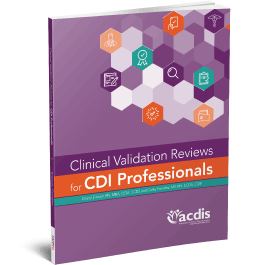Book excerpt: Clinical validation assistance

and Cathy Farraher, RN, MBA, CCM, CCDS
By Cheryl Ericson, RN, MS, CCDS, CDIP, and Cathy Farraher, RN, MBA, CCM, CCDS
Whenever CDI staff is uncomfortable sending a clinical validation query, the physician advisor should be consulted both prior to sending it, as well as prior to following up on the response if necessary. This ensures that the clinical validation query is constructed appropriately and is supported by the physician advisor. Incorporating the physician advisor in the process ensures that the treating physician receiving the query doesn’t feel that his/her clinical acumen is being questioned but that the CDI team, supported by the experience of its physician advisor, has determined that a clinical validation query is necessary to provide medical record clarity.
Although a very experienced CDI specialist may be able to construct a similar query without physician advisor assistance, it may be preferable to have the physician advisor involved, particularly during the rollout period, to ensure that these queries are 100% accurate. Some programs may decide that all validation queries first must be passed by the physician advisor for constructive criticism and clinical education to allow for a query that is constructed in a way that will be most readily received by the treating physician.
Once a program moves from the beginner stages of a clinical validation process to a more advanced one, the physician advisor can leverage data to provide education to physicians and help the team avoid the need for queries all together.
For example, CDI staff may notice a trend of acute hypoxemic respiratory failure documented for patients that do not qualify for this diagnosis based on their clinical indicators and treatment. In this scenario, the physician advisor may decide to offer an educational session for thoracic surgeons on that particular diagnosis. During the meeting with that specialty line the physician advisor may show the documentation trends and their effect on quality scores and reimbursement. Alternatively, the physician advisor may share this data with the specialty chair and provide tips to help improve the capture of supportive clinical indicators.
Involving the physician advisor in real-time clinical validation efforts also gives him or her the ability to identify educational opportunities throughout the hospital. Allowing your physician advisor to become a part of the clinical validation process flow can also allow for ongoing education of the clinical documentation team. The physician advisor can enlighten CDI staff with possible scenarios with which they are unfamiliar. It will also allow the physician advisor to become as aware of the non-responding clinicians as the CDI specialists are.
Editor’s note: This article is an excerpt from Ericson and Farraher’s book, Clinical Validation Reviews for CDI Professionals. To listen to a webinar with the authors on the topic of clinical validation, click here.
